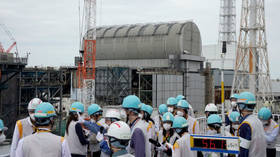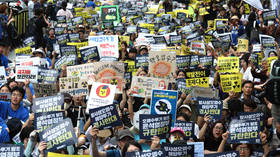China slams Japan over ‘irresponsible’ Fukushima plan

The Japanese government’s plan to discharge water from the stricken Fukushima nuclear power plant into the ocean is “extremely selfish and irresponsible,” Chinese Foreign Ministry spokesman Wang Wenbin said on Tuesday.
“The ocean sustains humanity. It is not a sewer for Japan’s nuclear-contaminated water,” Wang told reporters at the daily press briefing, calling the Japanese plan “unjustified, unreasonable and unnecessary.”
“Japan is putting its selfish interests above the long-term wellbeing of the entire humanity,” the spokesman added. “China is gravely concerned and strongly opposed to this.”
Beijing intends to take all necessary steps to “protect the marine environment, ensure food safety and safeguard people’s life and health,” Wang added, without giving specifics.
Earlier on Tuesday, Japanese Prime Minister Fumio Kishida announced that the dumping of waste water into the Pacific Ocean would begin on August 24, “weather conditions permitting.”
The Tokyo Electric Power Company (TEPCO) has for two years sought approval to start dumping water from the Fukushima Dai-Ichi nuclear power plant, which was crippled by the 2011 earthquake and tsunami. The plant produces 100 cubic meters of radioactive water every day, to keep its reactors from melting down, and TEPCO is running out of storage on site.
The company intends to release a total of one million metric tons of water into the ocean, starting with around 7,800 cubic meters over 17 days.
Tokyo insists that the wastewater has been treated and poses no danger to humanity or marine life, but Japan’s neighbors disagree. The ocean dump proposal has been endorsed by the International Atomic Energy Agency (IAEA), which said its impact on the environment would be “negligible.”
According to the UN nuclear watchdog, the wastewater contains about 190 becquerels of tritium per liter, well below the 10,000 becquerel limit set by the World Health Organization. IAEA Director General Rafael Grossi recently claimed the wastewater was safe enough for drinking and swimming. He did not respond to Beijing’s request to drink it himself, however.
“China and other stakeholders have pointed out on multiple occasions that if the Fukushima nuclear-contaminated water is truly safe, Japan wouldn’t have to dump it into the sea—and certainly shouldn’t if it’s not,” Wang told reporters on Tuesday.
While Beijing did not specify measures it intends to undertake in response, China’s special administrative regions of Hong Kong and Macao have already said they would “immediately activate” import controls on Japanese seafood, covering live, frozen, refrigerated, and dried fish, as well as sea salt and seaweed.













